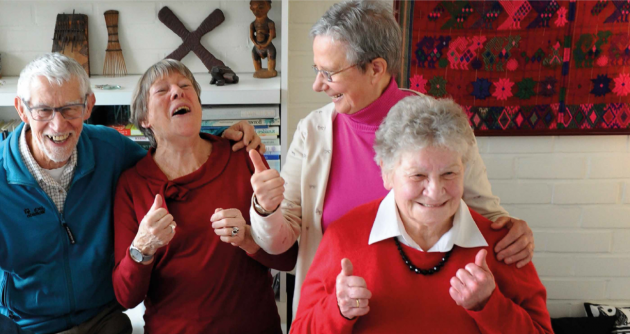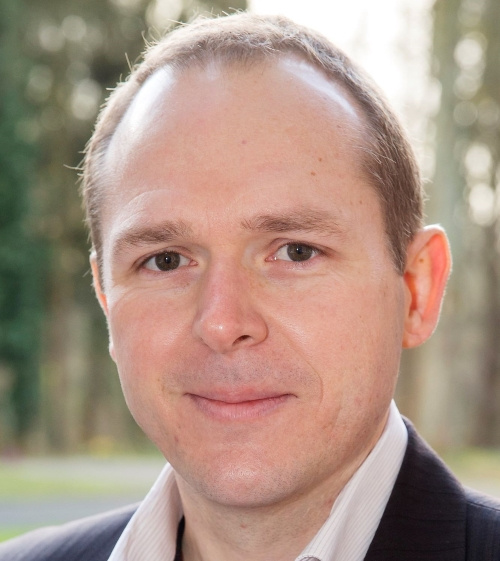Research Master in Gerontological Sciences
The Research Master in Gerontological Sciences offers a specific training trajectory to those excellent students who want to build up an academic career in the field of Gerontology. The program also provides an ideal preparation for starting a PhD in the domain of Gerontology.

Gerontology is the future
The world population is ageing. International organizations, such as the World Health Organization, consider the ageing population as one of the major topics that need immediate and thorough attention. The Research Master in Gerontological Sciences offers a specific training trajectory to those excellent students who want to build up an academic career in the field of Gerontology. It also provides an ideal preparation for starting a PhD in the domain of Gerontology.
Unique and interdisciplinary
The Research Master in Gerontological Sciences is unique in its kind in Belgium and surroundings. It is the only programme that studies the field of gerontology on a broad and multidisciplinary basis. It offers a wide spectrum of scientific aspects that is essential to understand the field of gerontology. The programme investigates the biogerontological and biomedical basis underlying the ageing process. But it also discusses the psychological, social and health policy aspects of older persons, like for example ethical themes and intercultural aspects. Students are stimulated to start from the principle of ‘free inquiry’ in order to reflect critically on current gerontological problems.
Students will have the opportunity to get embedded in ongoing interdisciplinary research projects of our associated research groups such as the Frailty in Ageing (FRIA) research group. Watch the introduction to Healthy Ageing.
Want to know more about next academic year?
Check out the latest updatesAny questions?
Don’t hesitate to write us an email. We’d be happy to help you on your way!
Contact us
Programme
The courses in the programme can be divided into two themes: gerontology and research methodology. The former focuses on the biological, biomedical, psychological and social aspects of gerontology, making you an expert in the field. The latter offers you skills to do research in the field of gerontology.
The foundations will be discussed in a package of course units that provides a thorough Bio-Psycho-social concept of Gerontological Sciences. Students will identify a topic at the end of the first semester of the first year, on which substantive work will continue under the supervision of a promoter through the master curriculum. Although this might implicate a certain degree of ‘specialisation’ in a certain domain of the Gerontological Sciences, most – if not all – research projects in which the students will be involved have a typical interdisciplinary character. Given the nature of this programme and the intensive coaching, daily presence on campus is required.
During the Research Master of Gerontological Sciences, the students will write two articles (one review article in the first year and one original research article in the second year) and submit them for publication in an international peer-reviewed journal. In addition, they will have to deliver a research proposal for a doctoral fellowship at the end of the first semester of the second year, which may be submitted in one of the known channels (FWO doctoral fellowship, SBO doctoral grant ...).
This is a two-year programme of 120 credits.

Degree
Plan
Study credits
ECTS (European Credit Transfer System): 1 credit represents 25-30 hours of study activity
AFTER GRADUATION
The Research Master in Gerontological Sciences paves the way for a successful doctorate in Gerontology by providing theoretical, but also methodological knowledge and skills for research into ageing and older people. Highly educated people can transfer pertinent knowledge about ageing and the older people to different settings/environments from a multidisciplinary perspective.

The future is yours
PhD holders in Gerontology can be engaged in the various universities as a postdoc fellow or a senior academic staff. The university is obviously not the only place where research is conducted. In addition, PhD holders in Gerontology can be engaged in policy functions and doctorate holders are desired in services from the welfare and health care that focus on innovation, quality, development and implementation of clinical pathways and guidelines and / or research.
Furthermore, the employment opportunities can also be found in various centres of excellence (for example, centre of excellence in dementia care), policy support centres, umbrella organizations and private research centres. These less traditional sectors require tasks such as data analysis as well as advisers, consultants, etc. to function. Besides the universities and scientific institutions, industries are also an increasingly important market for PhD holders. It is considered, therefore, that PhD holders in Gerontology would fit perfectly in R&D departments of large companies.

"We aim to contribute to a better understanding of the ageing processes and the development of bio-psycho-social strategies to avoid (unnecessary) accelerated ageing.
This is the way forward to an evidence-based promotion of healthy ageing and to protect our society from unproven 'anti-ageing' remedies."
Prof. dr. Ivan Bautmans, programme director
Careercenter
THE VUB HELPS YOU TO MAKE YOUR FIRST STEP IN THE JOB MARKET WITH WORKSHOPS, NETWORKING EVENTS, JOB FAIRS, TIPS ‘N TRICKS FOR JOB INTERVIEWS. ALL AN AMBITIOUS STUDENT NEEDS!
First step in the market
Phd?
IF YOU WANT TO CONTINUE YOUR ACADEMIC CAREER, YOU CAN APPLY FOR A PHD POSITION AT THE VRIJE UNIVERSITEIT BRUSSEL. ALL YOU NEED IS A PROMOTER, RESEARCH SUBJECT AND SUFFICIENT FUNDING. ARE YOU UP FOR THIS CHALLENGE?
More info
Want to know more about our alumni?
More infoFollow the VUB
On LinkedInGeneral requirements
The Research Master of Gerontological Sciences is aimed at students with an academic Bachelor or Master degree:
- Bachelor of Political Sciences and Sociology specialization Sociology Minor Management, Care and Policy in Gerontology (VUB);
- Bachelor in a field relevant to Gerontology (Social Sciences, Biomedical Sciences, Psychology, Physical Education and Kinesiology, Rehabilitation Sciences and Physiotherapy, …);
- Preparatory Programme in Management, Care and Policy in Gerontology (VUB)
Candidate students from outside the EEA may require evidence of adequate knowledge of English through one of the following criteria:
- Holder of a diploma of primary, secondary or higher education where English was the language of instruction;
- Successfully completed at least 1 school year of secondary education where English was the language of instruction;
- Successfully completed an education programme in the higher education sector where at least 15 ECTS credits were taught in English;
- Successfully completed general secondary education in Belgium;
- Succeeded in one of the following language tests:
a. TOEFL: minimum level 213 computer-based, 80 internet-based;
b. IELTS: minimum level academic module 6.5;
c. Cambridge Certificate of Advanced English (CAE), grade B;
d. Cambridge Certificate of Proficiency in English (CPE), grade C;
e. TOEIC: minimum level: 860.
Exceptions to the language requirement may be granted by the programme director on the basis of an interview.
Prospective students will be selected by the programme director on the basis of a well-justified application and an interview. The following criteria will be used to rank and select candidates:
- Motivation for starting the Research Master of Gerontological Sciences
- Interest in at least one of the following research areas within the Gerontology:
o Biological and Biomedical Gerontology
o Social Gerontology
o Psychological Gerontology
o Organization of health care in an ageing and intercultural society
- Study results obtained in the previous education can also be taken into consideration but is not an absolute eligibility criterion.
For more details on admission requirements and application
Click hereApplication deadline
Prospective students are advised to apply as soon as possible, even if they have not yet obtained their degree. Applications can only be submitted through our website www.vub.be/en/apply
- Students who require a visa (non-EU/EEA nationals) need to submit their application before April 1st.
- Students who do not require a visa must apply before September 1st.
- Note: if the proof of English proficiency or APS certificate is not ready before the deadline, you can always submit it later instead of missing the deadline
Tuition fees
The tuition fee for the Research Master in Gerontological Sciences for 2021-2022 is €947,20/year and €3245,20/year for respectively EEA and non-EEA students, given you take up all 60 credits in one year. A detailed overview of the tuition fee and its calculation can be found on:www.vub.be/en/tuition-fees